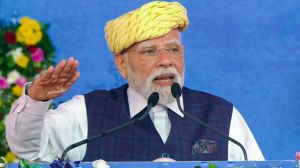In New York vs New Delhi, it’s Chief Justice vs Chief Justice
A routine business dispute between ICICI Bank and a little-known Japanese company being fought in the New York Supreme Court should hardly r...

A routine business dispute between ICICI Bank and a little-known Japanese company being fought in the New York Supreme Court should hardly raise a flutter here. So why’s the legal establishment in New Delhi all abuzz?
Because when was the last time you heard of a former Chief Justice of India, on record and in sworn testimony, slamming the Indian judicial system in a court overseas?
That’s what Justice B N Kirpal did this February, three months after his retirement.
Offering what he calls his ‘‘professional services’’ to the Japanese company which wanted the case tried in New York—not in New Delhi which is what ICICI Bank wanted—Kirpal told the court that the case could take up to 20 years if it were moved to India. Because of shortage of judges and the already huge backlog.
And to buttress this point, Kirpal shared a personal anecdote. He said a 1971 case in which he appeared for the Central Government was still pending and his daughter was now appearing in the same matter. ‘‘It is anybody’s guess as to when this case will be finally decided,’’ he added.
Countering him, for ICICI Bank, was another former Chief Justice, Justice A M Ahmadi. If Kirpal was harsh, Ahmadi expressed too touching a faith in last year’s reforms initiated by Law Minister Arun Jaitley. He argued that a case like this one could be wrapped up in just a year.
Last month, the New York judge ruled against ICICI Bank’s request for moving the case citing two key reasons: one, ICICI Bank is listed on the New York Stock Exchange and, two, Kirpal’s grim picture of the court system in India.
When contacted by The Sunday Express tonight, Kirpal said: ‘‘Let’s not delude ourselves about the problem of delays in our courts. There are already several judgments passed by the US courts holding that India is not a convenient forum for business disputes because of the inordinate delays. The situation won’t change till there is a big increase in the number of judges.’’
Asked about the propriety of a former CJI swearing an affidavit to help a company avoid adjudication in India, Kirpal said: ‘‘This isn’t the only case in which former judges have given an opinion. It’s a common professional engagement. It’s just that the US procedure requires the expert opinion to be in the form of an affidavit.’’
But in commercial disputes, don’t Indian courts often grant main relief within a short time through interim orders even while the suits remain pending? ‘‘I can’t say anything to that till I look into papers,’’ Kirpal said.
The case, in brief:
• In November 2000, Delhi-based Aksh Optifibre signed a contract with Japanese company Shin-Etsu Chemical, for supply of fibre-optic cables used in the telecom industry. Aksh opened a revolving letter of credit from ICICI Bank to ensure payments. As per the contract, Aksh is supposed to nominate the carrier for the shipment.
• In July 2002, Aksh told its carrier not to accept any further cargo from Shin-Etsu till further notice. This made Shin-Etsu get another carrier for that month’s shipment. ICICI Bank declined to pay for that shipment saying it wasn’t in conformity with the letter of credit opened by Aksh.
• Shin-Etsu filed a suit against ICICI Bank in New York though the cause of action arose in New Delhi. The Bank challenged the jurisdiction of the Supreme Court of New York in the matter. On August 5, the court ruled against ICICI Bank on both counts: jurisdiction and the merits of the dispute.
For the former, Justice Ira Gammerman relied on Justice Kirpal’s affidavit that ‘‘if the action were pursued in India it would take between 15 and 20 years to be resolved.’’
After giving a detailed and candid account of the backlog of cases in India, Kirpal said if Shin-Etsu ‘‘was to file the present case in a court in India it would take about 10 years, if not longer, before the same will be decided by a court in the first instance. The appeal process would add a further five to ten year period to the final resolution of such a case.’’
Kirpal’s final word: ‘‘In view of the inordinate delay that occurs in deciding such a case in India, it would not be a convenient forum for the institution of such a case.’’
In the process, Kirpal was rebutting an affidavit sworn in December 2002 from the side of the bank by Justice Ahmadi who set much store by recent reforms in the Civil Procedure Code (CPC) ‘‘to expedite disposal of civil suits in general and commercial causes in particular.’’
Taking an opposite view, Kirpal said: ‘‘I believe that the changes which have been made in the CPC subsequently will have little or no effect in expediting the disposal of cases in courts.’’ Reason: ‘‘Shortage of judges, coupled with a huge backlog, is the prime reason for the delay in the disposal of cases in India.’’
Photos



- 01
- 02
- 03
- 04
- 05




























